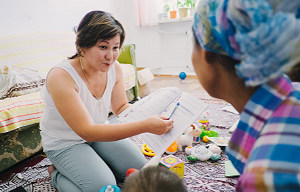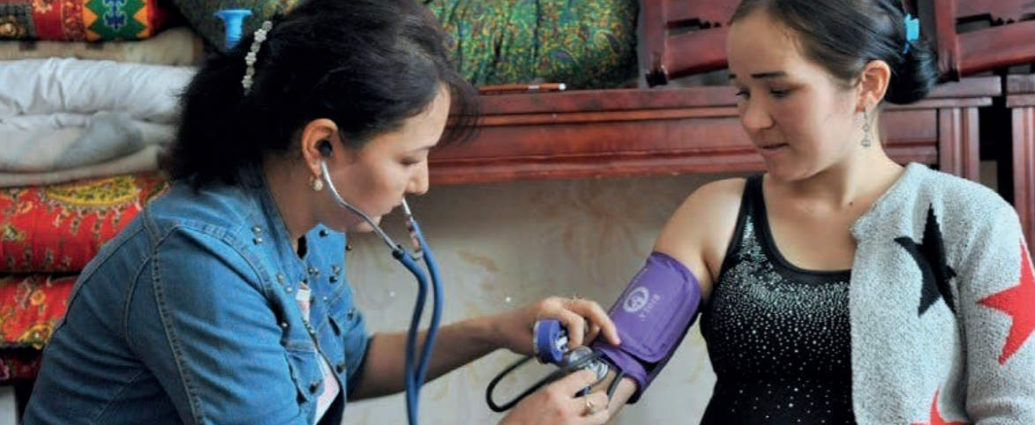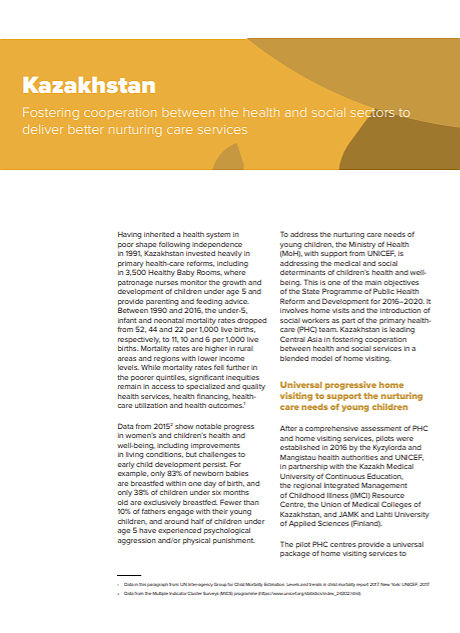Having inherited a health system in poor shape following independence in 1991, Kazakhstan invested heavily in primary health-care reforms, including in 3,500 Healthy Baby Rooms, where patronage nurses monitor the growth and development of children under age 5 and provide parenting and feeding advice. Between 1990 and 2016, the under-5, infant and neonatal mortality rates dropped from 52, 44 and 22 per 1,000 live births, respectively, to 11, 10 and 6 per 1,000 live births. Mortality rates are higher in rural areas and regions with lower income levels. While mortality rates fell further in the poorer quintiles, significant inequities remain in access to specialized and quality health services, health financing, healthcare utilization and health outcomes1.
Data from 20152 show notable progress in women’s and children’s health and well-being, including improvements in living conditions, but challenges to early child development persist. For example, only 83% of newborn babies are breastfed within one day of birth, and only 38% of children under six months old are exclusively breastfed. Fewer than 10% of fathers engage with their young children, and around half of children under age 5 have experienced psychological aggression and/or physical punishment. To address the nurturing care needs of young children, the Ministry of Health (MoH), with support from UNICEF, is addressing the medical and social determinants of children’s health and wellbeing. This is one of the main objectives of the State Programme of Public Health Reform and Development for 2016–2020. It involves home visits and the introduction of social workers as part of the primary healthcare (PHC) team. Kazakhstan is leading Central Asia in fostering cooperation between health and social services in a blended model of home visiting.
Universal progressive home visiting to support the nurturing care needs of young children
After a comprehensive assessment of PHC and home visiting services, pilots were established in 2016 by the Kyzylorda and Mangistau health authorities and UNICEF, in partnership with the Kazakh Medical University of Continuous Education, the regional Integrated Management of Childhood Illness (IMCI) Resource Centre, the Union of Medical Colleges of Kazakhstan, and JAMK and Lahti University of Applied Sciences (Finland).
The pilot PHC centres provide a universal package of home visiting services to all pregnant women and families with children aged under 5. Patronage nurses, trained in the UNICEF Europe and Central Asia modules on nurturing care for home visitors, visit families and give basic information and advice. When they detect particular needs (e.g. breastfeeding difficulties, child sleep problems, mild difficulties in development) they make additional visits. For more complex situations (e.g. precarious living conditions, postpartum depression, developmental delays) they involve social workers and the PHC team’s psychologist and jointly develop an individualized family plan. Some families require support by specialists from social protection departments, employment centres or early education centres.
To facilitate this collaboration, a technical working group elaborated a nine-step algorithm for case management. Patronage nurses and social workers in both pilots received training in 2017 to use this tool, as well as in joint case management.
Protocols of inter-agency cooperation between the PHC centres, social services, early education and other relevant agencies facilitate clear communications, access to shared information about vulnerable families, and smooth referral and service delivery – all contributing to enhance the effectiveness of the PHC team’s social workers in supporting vulnerable families. Additionally, to reduce staff turnover and burnout, the PHC management established an internal system of supportive supervision to help patronage nurses dealing with difficult cases, guide them in the use of procedures, and strengthen their competencies and motivation for personal growth. Box 1 describes how Kazakhstan is strengthening its workforce.
| Box 1. Building a workforce to provide nurturing care services The Kyzylorda Resource Centre has been established to provide: five-day training on IMCI; five-day training on universal progressive home visiting and nurturing care; and training on emergency services for infants and children. During 2017, 546 doctors, patronage nurses, social workers and midwives were trained; 1,200 specialists in 17 PHC facilities will be trained in 2018. Kyzylorda’s trained specialists will be available to provide training in other regions on request. The Resource Centre has been operating at full capacity (with 25 trainees) since March 2017. To strengthen the national workforce, UNICEF and the Union of Medical Colleges of Kazakhstan have developed manuals on the assessment tools, case management, supervision and continuous education needed for the in-service training of practitioners at PHC facilities, managers and patronage nurses. With the Kazakh University of Continuous Education, the existing national IMCI trainer network is being utilized to roll out the training on this new approach to home visiting across the country. The printed guidelines on universal progressive home visiting, along with the nurturing care modules, were submitted to 54 medical colleges across Kazakhstan, and have already been adopted by 10 for incorporation into pre-service vocational and degree curricula for nurses and medical students. These guidelines will be approved by the Republican Centre for Health Care Development to certify the educational status of these colleges. Furthermore, it is expected that the nurturing care modules will be integrated into the educational programmes of 80 Kazakh vocational medical colleges. |
|---|
Addressing implementation challenges

Valuable lessons have been learned about how to address system constraints and barriers, at both national and local levels, including by developing enabling policy frameworks and standards for interdisciplinary and intersectoral collaboration, and by investing in the training of new and existing frontline workers to support families in providing nurturing care. Well-structured case management procedures, referral algorithms, a curriculum, a real-time data system, community mapping, intersectoral agreements, and staff training and supervision procedures are all available for sharing upon request.
Evidence of impact
During 2017, 9,960 households in Kyzylorda oblast were reached with the universal package of home visiting services. About 16% (1565 cases) received more intense services delivered by the PHC’s multidisciplinary team and specialists from other agencies. Each patronage nurse visits on average 200-250 families, 9 of which need more intense support. A recent assessment showed that patronage nurses and social workers in the pilot facilities visited more households per month than their colleagues in other municipalities; they linked families with social services, crisis centres, employment services, migration police, day-care facilities and kindergartens. The universal progressive home visiting services are already making a positive impact on mortality rates: between 2016 and 2017 the infant mortality rate decreased from 14.4/1,000 to 8.8/1,000 and the under-5 mortality rate fell from 17.7/1,000 to 12.1/1,000. Between 2015 and 2017 the number of children who were exclusively breastfed increased by 14% and the number of formula-fed infants decreased from 18,444 to 8,600; as well as the health benefits gained, this reduction in expenditure on formula resulted in financial savings of more than US$ 250,000.3
Similarly, the percentage of mothers able to identify danger signs indicating illness increased from 51% in 2016 to 63% in 2017. Increased trust in the nurses and near universal communication between parents and nurses on child development practices were also reported.
Looking forward
Kazakhstan’s Ministry of Health supports the gradual replication of the pilot nationwide. The proposed workplan (2019– 2021) focuses on: 1) strengthening the professional competencies and practical skills of PHC staff, working with families; 2) implementing a system for monitoring the quality of patronage services in selected regions; 3) establishing standards and norms for home visiting based on the pilot experience; and 4) implementing a new system on monitoring child injuries. In addition, in 2018, the programme’s costs and benefits will be assessed.
| Our joint programme with UNICEF is a fantastic project. It needs to be replicated across all regions of Kazakhstan. According to results of pilot PHC facilities in Kyzylorda oblast, the maternal mortality rate equals zero, although only two years ago the situation was completely different. Elzhan Birtanov, Minister of Health of the Republic of Kazakhstan |
|---|
Endnotes
1 Data in this paragraph from: UN Inter-agency Group for Child Mortality Estimation. Levels and trends in child mortality report 2017. New York: UNICEF; 2017.
2 Data from the Multiple Indicator Cluster Surveys (MICS) programme (https://mics.unicef.org/).
3 Annual Report of Department of Health of Kyzylorda oblast to the Ministry of Health, 11th December 2017.
For more information, please contact NurturingCare@who.int
Acknowledgements: This profile was developed in support of Nurturing Care for Early Childhood Development. A framework for helping children to survive and thrive to transform health and human potential.
Writers: Kanat Sukhanberdiyev and Larissa Tikhonova, UNICEF Kazakhstan
Contributors to development and review: Matthew Frey, Bettina Schwethelm. Design: PATH






